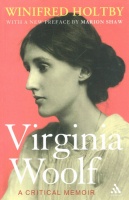kategóriák
- Közlekedés ajánlójegyzék
- Szocreál ajánlójegyzék
- Reklám ajánlójegyzék
- Fotó ajánlójegyzék
- Kínai-japán ajánlójegyzék
- Szentkép ajánlójegyzék
Új árakkal! - Új szentkép ajánlójegyzék II.
- 12 érdekes régiség
 Könyv
Könyv
 Bibliofilia
Bibliofilia
 Régiség
Régiség
 Metszet
Metszet
 Térkép
Térkép
 Fotó
Fotó
 Papírrégiség, Aprónyomtatvány
Papírrégiség, Aprónyomtatvány
 Plakát
Plakát
- Cirkusz
- Modern grafika
- Szocreál
- NER Irodalom
- Egyéb
kosár
Holtby, Winifred : Virginia Woolf - A critical memoir
- leírás
- további adatok
"Miss Holtby is writing a book on me." Virginia Woolf noted in her diary in March 1931. Winifred Holtby was 33, a well-respected author with four novels and much journalism to her name. She had yet to write her most famous novel, South Riding, but had already formed the close bond with Vera Brittain that was to lead to the latter writing Testament of Friendship in tribute.
Holtby lived in London, lecturing for the League of Nations and active in the Independent Labour Party; Woolf was at the peak of her success as a novelist, having just published The Waves. Holtby, having decided to write her critical memoir, approached the task in a roundabout fashion, sending requests for information not to her subject, but to Vanessa Bell, Leonard Woolf and Ethel Smyth. Woolf, amused and frustrated in equal measure, summoned Holtby for tea, wanting a good look at the woman who was to publish the first biography of her in the English language.
Holtby noted down her impressions of the Woolfs, conjuring up a memorable image of the novelist at work in a large room piled high with "books, parcels, packets of unbound volumes" belonging to the Hogarth Press. Woolf's record of that first meeting was less complimentary: "I saw her myself, and found her a Yorkshire farmer's daughter, rather uncouth, and shapeless," she wrote to her sister. Something of this hostility must have been obvious at that first meeting, for Holtby, when she'd finished her work in draft, sent it not to Woolf, but to Ethel Smyth. This caused another amused outburst: "What an amiable donkey that woman Holtby is! Why doesn't she send the biography straight to me?" When the book was published in 1932, Woolf was mischievous, first purporting to have "roared with laughter" at it and then not to have read it at all, claiming that "I'm told her book is bad" before writing Holtby a flattering letter of thanks.
If she had read it (and of course, most writers would have found it hard to resist such a tribute), she must have been at least a little impressed by Holtby's intuitive, admiring readings of her major novels and her confident, critical assessment of The Common Reader and A Room of One's Own. Holtby's style is sharp, masterful and concise, rendering her a far cry from the "poor gaping Holtby" described in Woolf's diaries. She demonstrates a supreme grasp of the difference between modernist and traditionalist writing in the 1920s and 1930s.
She also (and this might account in part for Woolf's refusal to embrace the book) is well aware of the limitations in Woolf's earlier novels and is unafraid to point them out, albeit with quiet tact. Discussing Woolf's second novel, Night and Day, she claims that it is "this straining towards some larger life, some more liberal standard of values, which disturbs the quiet and enclosed perfection of the comedy" and that Woolf's characters "are too big for her plot".
In the chapter entitled "The Advantages of being Virginia Stephen", Holtby makes much of the positive influence upon her early work of Woolf's Victorian upbringing: the advantages of being given the run of Leslie Stephen's library; the lack of enforced religion; the chance to learn Greek and the great stretches of leisure time in which a fledgling novelist might practise her art. She spends less time in discussing the disadvantages of being Virginia Stephen, perhaps frightened of incurring Woolf's wrath. Holtby's approach to her subject is more often protective than provocative. She excuses Woolf for not becoming immersed in the women's suffrage movement, reminding us that "while speaking and marching", a creative woman could not possibly "maintain that equilibrium and concentration which are necessary for an artist".
When she is unimpressed, Holtby tends towards the brusque, but never loses the tone of respect: "The Voyage Out has a plot. Mrs Woolf does not really like plots." She is at her best when discussing the later novels; writing of To the Lighthouse she describes Mrs Ramsay as "built of light", illuminating the lives of the people around her. Holtby understands Woolf's own ambitions for a new type of novel where the characters possess "double purpose... they are themselves and they are symbols. They are part of the visible universe and they are its interpretation."
Holtby's own role in the "visible universe" came to an abrupt and tragic end when she died of kidney disease at only 37, three years after her book on Woolf came out. Woolf read South Riding some years after it was published posthumously, complaining that "one's never pulled up by a single original idea". She reminisced about Holtby in a letter, writing: "I couldn't help laughing to think what a story she could have told had she known the true Virginia."
In fact, Holtby's short, artful critique of Woolf and her work, written with the benefit of having met the author, seems to get closer to revealing the "true Virginia" than many later attempts. Anyone who has read Woolf's diaries (published some 50 years later than this book) will agree with Holtby's perceptive belief that Woolf "worships the intellectual virtues of intelligence and honesty; that she thinks amiability overrated, and despises self-deception".
Holtby's book has, on the whole, stood the test of time, although some phrases (Mrs Dalloway is twice referred to as a "thimble-pated chatterer") hark back to the 1930s. Holtby admitted that she wrote Virginia Woolf primarily to ascertain her own direction as a novelist. Despite this, her excellent readings of Woolf's texts hold their ground among more recent studies and there is no better justification for a new edition of her book than this insightful conclusion on Woolf both as writer and woman:
"She has qualities which will wear better than mere readability or the luxury of romance. Her art is tragic. She understands all shades of grief; life passes before her under the perpetual menace of death, which robs even while it fulfils. For all her lightness of touch, her moth-wing humour, her capricious irrelevance, she writes as one who has looked upon the worst that life can do to man and woman, upon every sensation of loss, bewilderment and humiliation; and yet the corroding acid of disgust has not defiled her. She is in love with life."
The Independent
| állapot: |      |
| kategória: | Könyv > Életrajz > |
| kategória: | Könyv > Irodalomtörténet > |
| kategória: | Könyv > Idegennyelvű könyvek > Angol nyelvű > |
| kiadó: | Continuum, 2007 |
| cikkszám / ISBN: | 9780826494436 |
| kötés: | fűzve |
| oldalszám: | 205 |
| könyv nyelve: | angol |









 Telefon:
Telefon: E-mail:
E-mail:







